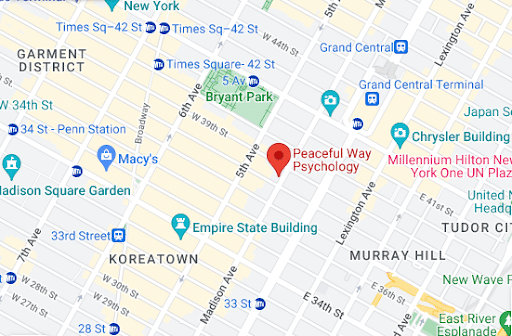
Cognitive Behavioral Therapy (CBT) combines both cognitive and behavioral techniques. The cognitive therapy portion is based on the premise that people can learn to think in different, healthier ways. The behavioral therapy portion is based on the concept that behaviors are learned and, therefore, new behaviors can be learned and replace unhealthy behaviors. CBT also helps you become more conscious of how your thoughts affect your mood. You learn to monitor negative thoughts, which are typically exaggerated, and use different strategies to replace irrational thoughts with more reasonable, empowering ones. You then behave differently in reaction to differently perceived circumstances. CBT provides an effective method of changing your way of viewing yourself and your environment, as well as changing your behavior.
Psychodynamic Psychotherapy
Psychodynamic Psychotherapy is also known as insight-oriented therapy. It has evolved as a more practical and less lengthy alternative to psychoanalysis. In Psychodynamic Psychotherapy, your emotions, thoughts, life experiences, and beliefs are examined to gain insight into your present day situations and to understand the patterns you have developed over time. Identifying recurring patterns helps you see how you have dealt with emotional distress and what defense mechanisms you have developed in order to cope. However, when overutilized, these methods of coping can cause other difficulties in life. A psychodynamic approach enables you to understand personal issues and problematic behaviors that have resulted from past relationship dynamics and that continue to manifest themselves in painful present day circumstances. With this awareness, you can proceed to make different choices and replace painful patterns with a healthier way of living.

Dialectical Behavioral Therapy (DBT)

Dialectical Behavior Therapy (DBT) is a modified form of Cognitive Behavioral Therapy (CBT) that was designed to help people let go of self-defeating patterns. It was originally formulated to help people with personality disorders, but research has shown it to be very effective with other issues. DBT is now commonly utilized to decrease anxiety, manage stress, alleviate depression, and improve relationships with romantic partners, friends, family, or colleagues. DBT helps you to regulate your emotions by learning about the triggers that lead you to react in detrimental ways and then practicing appropriate coping skills. You improve your relationships by learning strategies to ask for what you need, say no, and cope with conflict. Mindfulness and stress tolerance are also components of DBT that teach you to pay attention to the present moment without judgment, and to recognize difficult situations without being overwhelmed by them or the emotions they evoke.
Life Coaching
Life Coaching is a direct and goal-oriented approach to help you achieve your ambitions in your career and personal life. It generally involves an assessment of your current situation, including any obstacles and challenges, and a clearly defined goal. If you do not have a clear goal, then coaching can help you to explore your options and decide on a goal. Then a course of action is formulated to move you from your current situation to your desired outcome. Throughout the coaching process you receive supportive guidance as you encounter different challenges. Although coaching draws from a number of disciplines, including sociology, psychology, and numerous forms of counseling, it is less concerned with past experiences and more concerned with future achievements.

Mindfulness

Mindfulness is a state of awareness that is non-judgmental, accepting, and inviting of whatever arises in the moment, within you or your environment. To be mindful is to focus on the present moment, rather than being preoccupied with pain from the past or anxiety about the future. Mindfulness promotes the development of emotional stability, inner calmness, and non-reactivity. By practicing this form of awareness, you learn to disentangle yourself from habitual thoughts, emotions, and behaviors and connect with your current experience. Mindfulness allows you to handle situations with considered action rather than habitual reaction.
Motivational Interviewing
Motivational Interviewing is a collaborative and empowering treatment modality focused on your inherent drive to make healthy and positive adjustments, particularly in areas where you’re feeling conflicted or unprepared for change. Your therapist will help you uncover any ambivalence or insecurity you have about a particular behavior or issue, and will help you to identify and work to resolve this internal conflict. Together, you and your therapist will use this motivation to determine realistic, actionable, and incremental steps that will enable you to shift your behavior to better align with your goals. Because these steps are determined collaboratively, with your goals and internal motivations front and center, you will be prepared for and committed to these changes and able to sustain them over the long term.

Solutions Based Therapy

Solutions Based Therapy is a goal-oriented technique that utilizes your personal history to aid in responding to present day challenges. Your therapist will help you to explore and identify ways in which you have successfully addressed previous challenges in terms of work, school, family, or other relationships. By learning more about your strengths and resilience, your therapist will help you to identify what approaches, skills, or coping methods are most useful in your current situation. Put simply, this approach will help you to understand what works in certain areas of your life and apply it to other areas of your life. This is a person-centered therapeutic approach that depends on the unique wisdom you have with regard to your own life experiences, circumstances, needs, and abilities, and has been proven to be highly effective in treating diverse populations and problems.
Therapy In Person and Online
Contact Us
Now accepting AETNA insurance!

